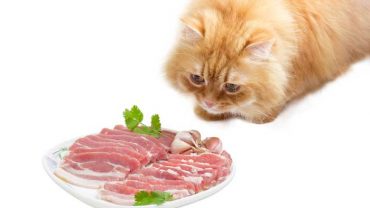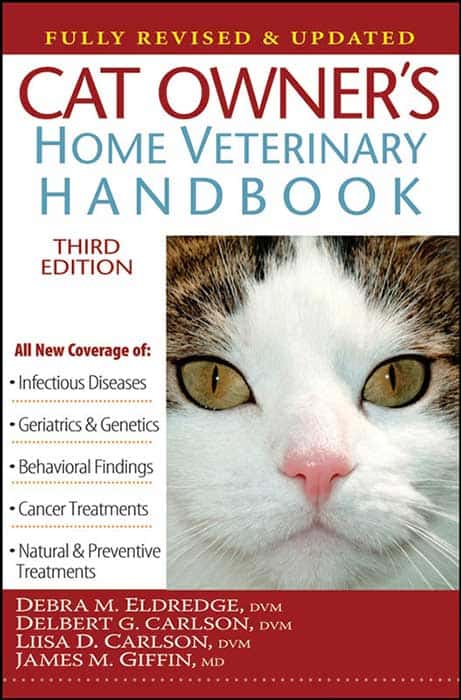Can Cats Eat Bacon?
Bacon ranks among the greatest human foods of all time. From its yummy taste to its enticing look and the striking aroma, everything about bacon appears designed to make everyone fall in love with them.
Some people eat bacon as an occasional treat while in other homes, the food forms part and parcel of every breakfast.
If you own a cat, the chances are that your furry friend usually begs for bacon each time it spots you eating one. The strong scent of bacon will surely pique any cat’s curiosity.
In most cases, the cat won’t even have to spot you enjoying this delicious treat, as the mere presence of bacon in your kitchen shelves or refrigerator is all it takes to get it worked up.
So, as a loving and responsible pet parent, you may find yourself asking the all-too-important question, can I give my cat bacon?
Yes, cats can eat bacon, and there shouldn’t be immediate health concerns to worry about. However, you should offer bacon to your cat only as an occasional treat.
As you shall find out, bacon carries potentially dangerous risks if you offer it to your cat more frequently than you should.
Read on for more insights on cats and bacon.
Table of Contents
What Exactly Is Bacon, And Is Bacon Healthy For Cats To Eat?
Now, you could be wondering to yourself, is bacon good for cats, and what happens if a cat eats bacon? Even before we explore these questions in detail, let’s examine the stuff that bacon is made of.
The USDA defines bacon as a salt-cured pork belly. However, this definition, like many others, is quite limiting, as bacon can be made from various other parts of a pig.
In fact, the meat doesn’t necessarily have to come from pigs. It can also come from cows, turkeys, etc. However, pork-based bacon is the most popular, and all reference in this post shall be made to it.
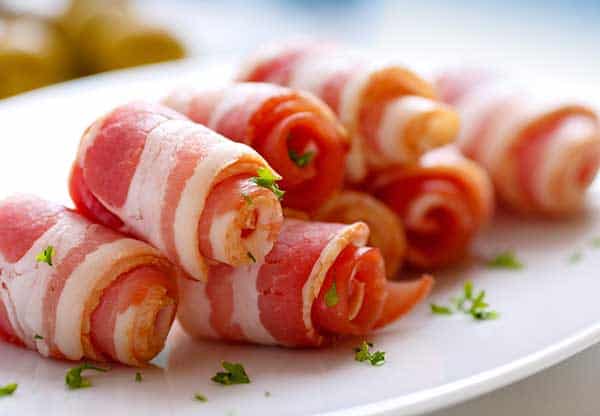
To prepare bacon, pork bellies are soaked in preservatives, the most common ones being nitrite and salt.
Nitrite is used to prevent botulism, while salt inhibits the growth of bacteria in the meat. The two also enhance the flavor of the meat.
Besides salt and nitrite, bacon also features numerous other flavorings, spices, and additives. Most of the additives are incorporated as taste- and flavor-enhancers.
After curing, bacon is cooked in a convection oven. It can also be smoked using traditional smoking techniques. However, smoking is less preferred for mass production of bacon, due to its time- and energy-intensiveness.
Now, the yummy taste and inviting aroma aren’t everything there is to bacon. The food is a rich source of essential vitamins and minerals, including several B vitamins, animal protein, magnesium, and iron.
In every 100-grams of cooked bacon, you get;
- 37 grams of animal protein;
- Over 80% of the RDA for selenium;
- Over 50% of the RDA for phosphorus;
- Vitamins B1, B2, B3, B5, B6, and B12, and
- Significant levels of zinc, iron, magnesium, and potassium.
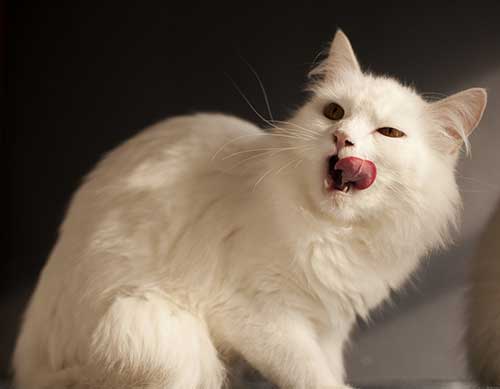
In light of bacon’s incredible nutritional profile, you may be wondering to yourself, is bacon good for cats? Not necessarily.
? Remember, the way humans process the minerals in food components is quite different from how our feline friends do. Also, there are numerous other high-quality, low-fat meats that contain all the above minerals and more.
So, bacon’s dietary profile isn’t enough reason to offer the food to your cat.
Let’s explore the other things that could go wrong if you make bacon one of your kitto’s staple foods.
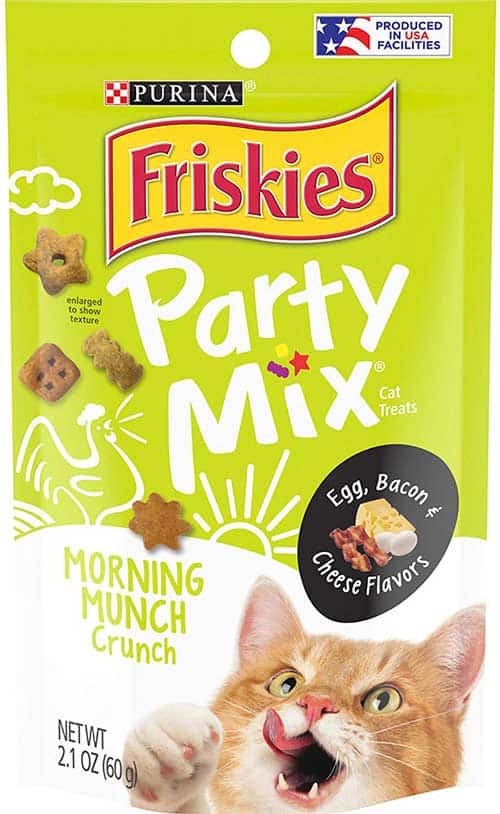
What Are The Concerns With Cats Eating Bacon?
So, we’ve highlighted some of the nutritional elements that bacon contains, and pointed out that those nutrients shouldn’t be the sole motivation behind feeding bacon to your cat.
So, what could possibly go wrong if you offer bacon to your feline friend more frequently than experts recommend?
The following are some of the features of bacon that make them less attractive foods for cats.
1. Processed Meat
Unless you have been living under a rock, you must already know the position that experts hold on processed meats for human consumption.
According to numerous research studies, high intake of processed meat is linked to heart disease as well as cancers of the breast, lungs, colon, and liver. Some studies also associate processed meat with increased risks of obesity and diabetes.
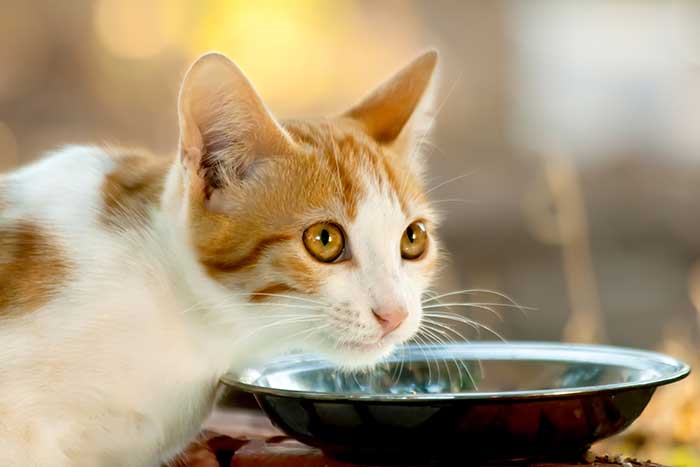
While most of the studies on the dangers of processed meat were conducted on humans, we can easily extrapolate them to our feline friends.
It’s undeniably true that cats are obligate carnivores, hence enjoy diets of animal protein. However, processed meat will likely cause them more harm than good.
2. High Salt Concentration
As we’ve already mentioned, bacon is mostly cured using salt, and high salt intake is just as dangerous as consuming processed meat.
A small slice of cooked bacon is believed to contain over 135 milligrams of sodium. That works out as around ten times more than a cat’s recommended daily sodium intake.
High sodium intake could lead to a wide range of medical conditions for your cat. The immediate effect of excess sodium is frequent thirst sensation, which is followed by frequent urination.
Other symptoms of high salt content in your cat’s system include;
- Gastrointestinal complications, such as nausea, vomiting, and diarrhea;
- Lethargy;
- Dehydration;
- Seizures;
- Elevated blood pressure;
- Obesity; and
- Clogged blood vessels.
Note that sodium ion poisoning is a fatal condition. So, if you suspect that your cat has eaten excess bacon and it exhibits any of the above symptoms, you should enlist the services of a vet immediately.
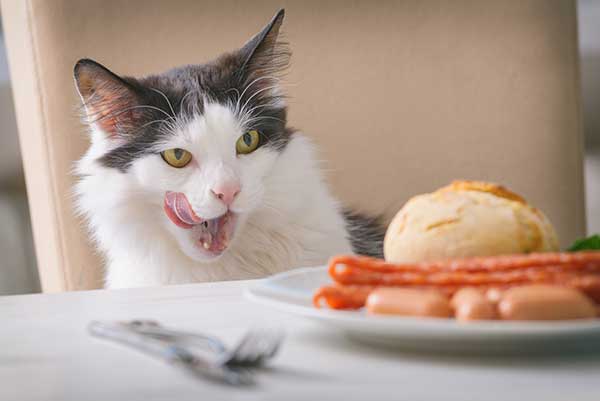
3. High Fat Content
The mere fact that bacon is derived from pork belly means that it’s laden with high fat.
According to studies, bacon contains up to 40% of unsaturated fat as well as 10% of polyunsaturated fat and lots of cholesterol. And the fact that most people don’t trim this fat when preparing bacon makes the food unhealthier for cats.
High fat intake is linked to risks of obesity, diabetes, and heart disease. The worst part is that fat comes with a degree of tolerance and dependency.
So, if you regularly feed your feline friend high-fat foods, the cat is likely to develop a taste for fatty foods. Eventually, it may refuse to take its usual healthy cat food, further complicating its condition.
Like salts, fats also clog the arteries, thereby causing spikes in blood pressure and other blood circulation complications.
Remember, an average cat sleeps 16 – 20 hours a day, which means they have minimal time to exercise and burn the excess calories they get from eating fatty foods like bacon. So, your best bet is to offer bacon to your cat only occasionally or avoid it altogether.
4. Preservatives
Bacon also contains nitrates, nitrites, and nitrosamines. All these are added to cure the meat, but they present serious risks to your feline’s health. According to research, the compounds promote the growth of cancerous cells.
Fortunately, most bacon producers nowadays add erythorbic acid and vitamin C to modulate the effects of these carcinogenic compounds. But still, you should be apprehensive about introducing potentially carcinogenic substances into your cat’s system.
Besides the above risks of feeding bacon to cats, there are also concerns of choking and bacterial infections.
Can Cats Eat Cooked Bacon Or Should I Consider Raw Bacon Instead?
If you’ve decided to offer bacon to your cat, one of the dilemmas you’ll often face is whether to feed raw or cooked bacon to your furball. So, can cats eat raw bacon, or must I cook the food first?
Naturally, cats love their meat fresh and raw, and that’s how we should serve it to them. However, there are a few exceptions, as is the case with bacon.
Experts recommend that fresh and dried bacon be cooked before we can eat it or offer it to our cats. In our case, we usually prefer pan-frying the bacon. But for our feline friends, the bacon should be boiled.
Cooking bacon helps to kill all the harmful bacteria that are normally present in raw meat, which could lead to food poisoning for your feline friend. Besides, cooking makes bacon more tender, and your cat will find it a lot easier to chew and swallow, which prevents the risks of choking.
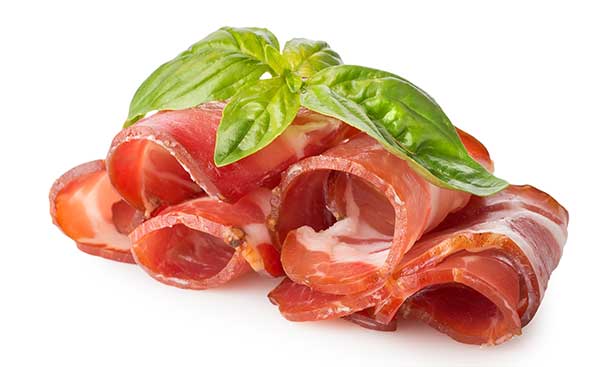
You must also note that the cooking method matters a lot. All bacon meant for cats should be boiled in plain water, without adding any spices, seasonings, or excess salt. So, if you’ve always wondered, can cats eat boiled bacon, you got your answer right there.
When ready, serve the bacon to your cat either as a standalone meal, or you could also mix it into your cat’s regular food.
Since experts recommend boiled bacon for cats, you could be wondering, can cats eat smoked bacon? Again, if any curing is involved, smoked bacon shouldn’t be offered to cats.
? Another thing you must take care of is the ideal temperature for preparing bacon. Experts recommend that bacon be cooked at an internal temperature of 140° F. At this temperature, you’ll be able to destroy all the dangerous worms that the meat might contain, such as trichina.
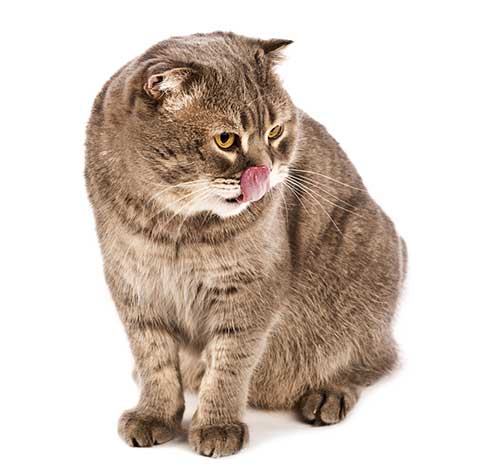
Can cats eat bacon raw?
Now, raw bacon is only fine where you can vouch for the quality of the meat. It should be truly raw, fresh, and not cured. Otherwise, insist on cooked bacon. So, what happens if a cat eats raw bacon?
? A lot could go wrong. The cat could develop an infection from trichina, also known as trichinosis, as well as other bacterial infections. Raw bacon for cats also presents choking hazards.
And what if I replace pork with turkey, can cats eat turkey bacon?
In terms of the amount of bacon grease each contains, turkey bacon is considered the healthier alternative to pork bacon. However, if the turkey bacon also goes through the usual curing process, then it’s not safe for your cat either.
Other cat owners could even be wondering, can cats eat bacon bits?
Well, you shouldn’t feed bacon bits to your cat for the very reasons that bacon bits contain high levels of salt, fat, and preservatives.
And what of Canadian bacon, can cats eat Canadian bacon?
Now, the convention here is to check on the quantity and quality of preservatives, sodium, and other additives used, then determine whether you should offer it to your cat or not.
So, Can Cats Eat Bacon?
A little bacon for your cat once in a while is okay. But if you can find healthier treat alternatives, then you should avoid feeding bacon to your cat altogether.

